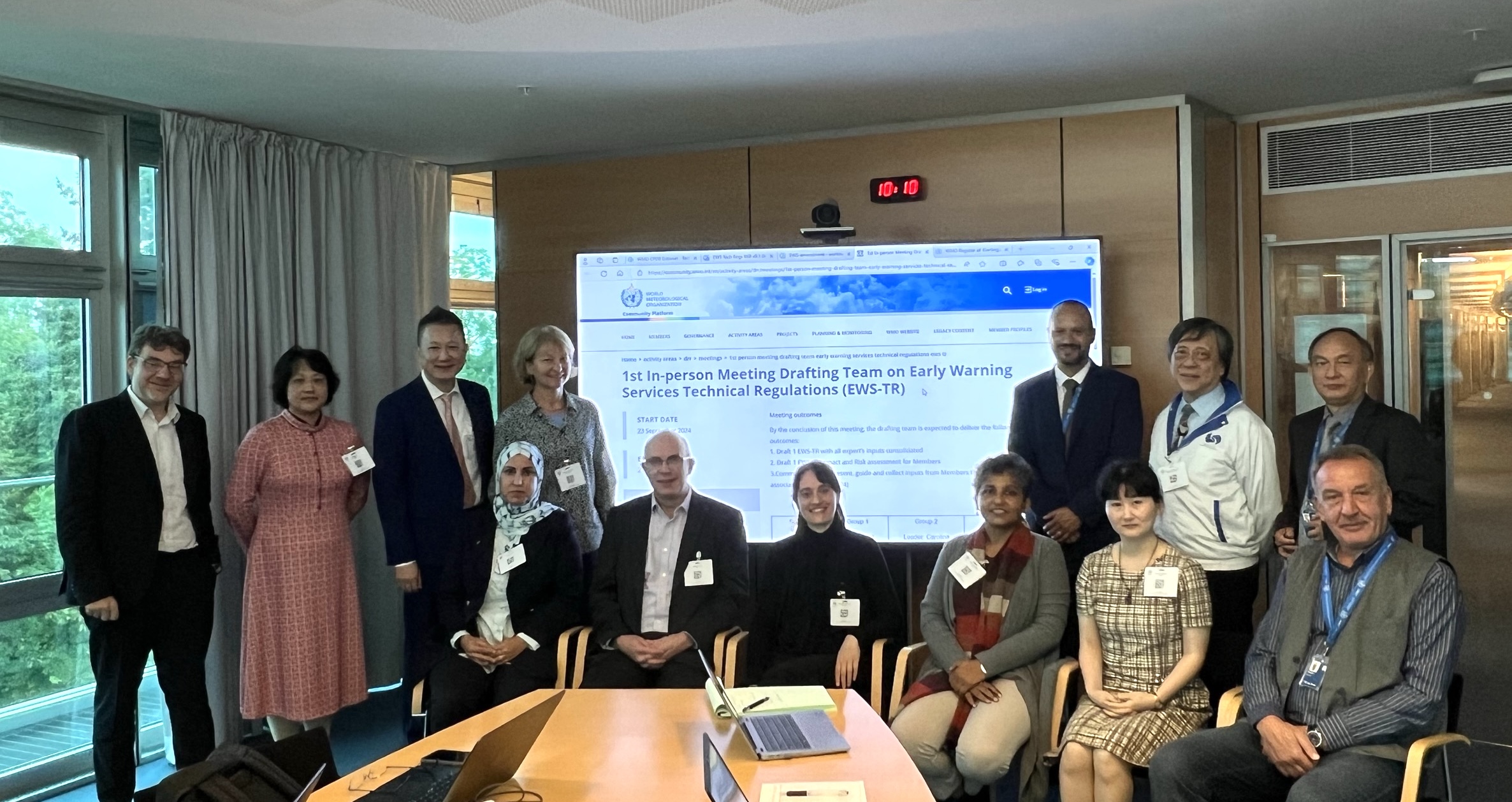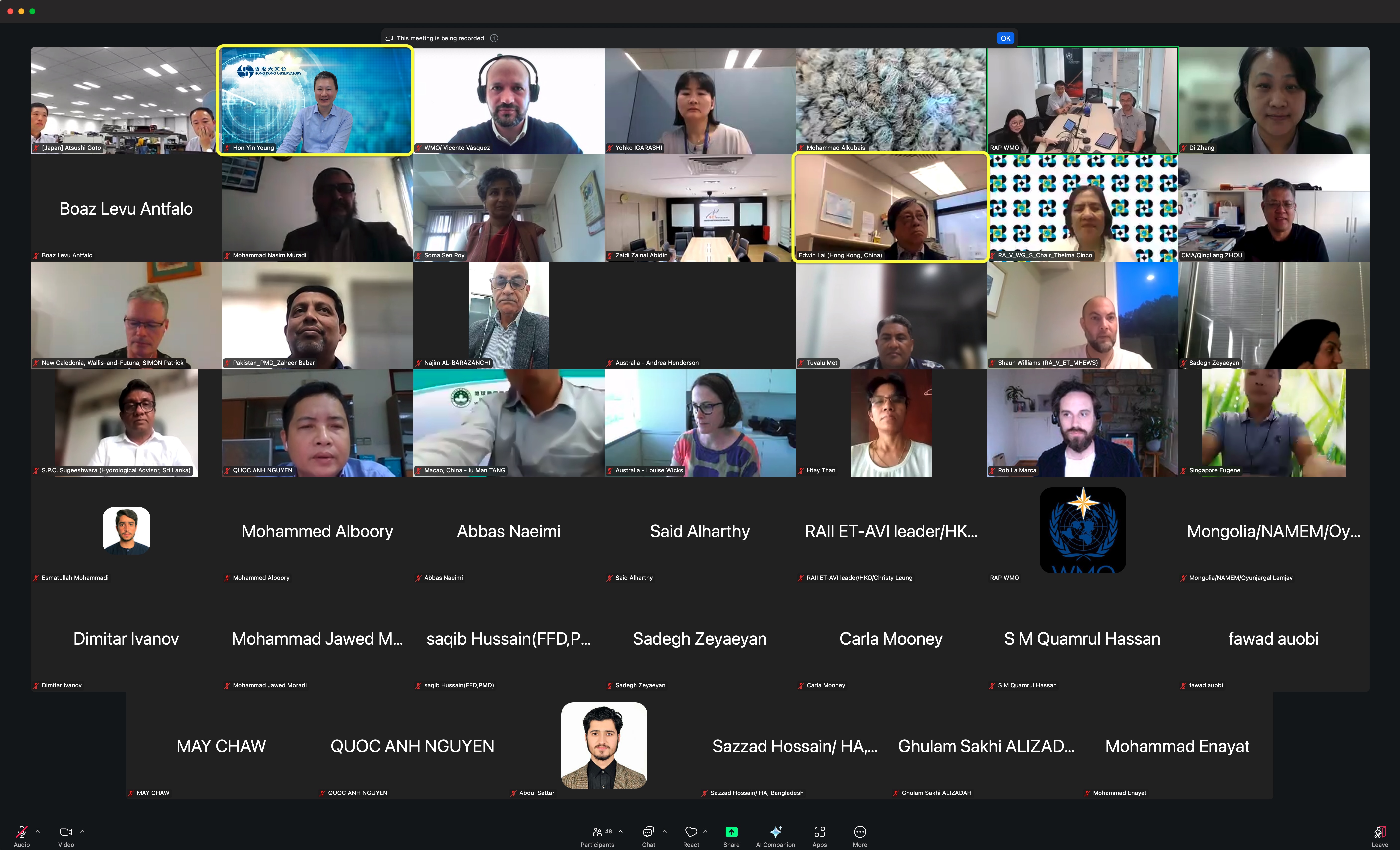The Observatory in support of UN’s “Early Warnings for All” Initiative and New International Technical Standards
24 March 2025
As appointed by the World Meteorological Organization (WMO), Mr Yeung Hon Yin, Senior Scientific Officer of the Hong Kong Observatory (HKO), has been serving as a vice chair of the new Expert Team on Multi-Hazard Early Warning and Service Delivery Technical Guidance since mid-2024 with the first mission to back the “Early Warnings for All” Initiative of the United Nations (UN) by developing new international technical regulations for early warning services (TR-EWS). Yeung has been actively engaged in the mission with a leading role to spearhead the drafting efforts, including the first TR-EWS drafting team meeting in Geneva, Switzerland in September 2024, the briefing sessions held online for different regional associations of WMO in November 2024, as well as the series of email discussion with the Secretariat during the subsequent months. Mr Lai Sau Tak, former Assistant Director of the Observatory, temporarily came out of retirement to join force with Yeung in support of the drafting work on a short-term part-time basis. With his rich experience in public weather services and disaster risk reduction, Lai had actively served in relevant responsibilities for years with WMO and Typhoon Committee. During the crafting of the provisions for TR-EWS, he contributed a lot of insightful ideas and pivotal inputs.
Reflecting on this historic mission, Lai and Yeung — mentor and protégé — shared their perspectives. Lai remarked, “I suppose this is unfinished work for me. My biggest regret as a forecaster is the death of tens of thousands of people caused by a typhoon-triggered storm surge in Myanmar in 2008. That is a very costly lesson for the meteorological community to learn, showing the need for global collaboration in ensuring critical warnings can reach out to all corners of the world. Setting out a necessary framework now nearly 20 years after the Myanmar catastrophe is at least better late than never”. With the Observatory's century-long experience in dealing with the perennial typhoons and rainstorms threatening Hong Kong, Yeung considered this an ideal opportunity for the Observatory to contribute and share its expertise to the world. He said, “The past nine months or so had been extremely demanding in terms of international affairs — relentless effort late at night and over weekends, the hustle and bustle of meetings and travelling, on top of all other priorities. Yet, being able to help shape a better world, together with the bonus knowledge, experience, and connections so gained, is truly precious and an once-in-a-lifetime opportunity. Looking back, every effort was worth it, indeed!”.
During the Extraordinary Session of the WMO Commission for Weather, Climate, Hydrological, Marine and Related Environmental Services and Applications held on 18-20 March 2025, the draft recommendation associated with the new technical regulations was formally consulted with Members and passed after some revisions. According to the plan, it will be submitted to the Extraordinary Session of WMO Congress in October this year for adoption. If things go smoothly, the new TR-EWS should then be ready in time for implementation starting from 2027.
The “Early Warnings for All” Initiative was initiated by the UN Secretary-General António Guterres in pursuit of universal protection for people from hazardous weather, water, or climate events through life-saving early warning systems by the end of 2027. It is built on four pillars that are also the cornerstones of effective multi-hazard early warning system:
Pillar 1 - Disaster risk knowledge (led by UN Office for Disaster Risk Reduction)
Pillar 2 - Detection, observation, monitoring, analysis, and forecasting (led by WMO)
Pillar 3 - Warning dissemination and communication (led by International Telecommunication Union)
Pillar 4 - Preparedness and response capabilities (led by International Federation of Red Cross and Red Crescent Societies)
On World Meteorological Day (23 March) 2022, Guterres spelt out his intentions quite clearly: “To that end, today I announce the United Nations will spearhead new action to ensure every person on Earth is protected by early warning systems within five years.” Towards the goal of ensuring that everyone on Earth is protected from hazardous weather, water, or climate events, WMO is taking the effort to update its technical regulations to facilitate Members in the determination and provision of the needed warning services.
 First meeting of the TR-EWS Drafting Team, 23-27 September 2024, Geneva, Switzerland.
First meeting of the TR-EWS Drafting Team, 23-27 September 2024, Geneva, Switzerland.
(Back row, third from left: Yeung Hon Yin; second from right: Lai Sau Tak)
 Briefing session on TR-EWS for WMO Regional Association (Region II: Asia) held online on 25 November 2024.
Briefing session on TR-EWS for WMO Regional Association (Region II: Asia) held online on 25 November 2024.
(First row, second from left: Yeung Hon Yin; second row, third from right: Lai Sau Tak)